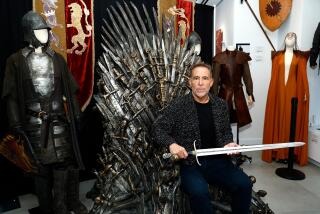This Manufacturer’s Marketing Is Off Its Rocker
- Share via
ASHEBORO, N.C. — One sure-fire way for furniture makers to drum up business is to stamp a new line of sofas, chairs and tables with a famous name such as golfer Arnold Palmer or artist Norman Rockwell.
Consider then the modesty of tiny P&P; Chair Co., which refuses to commercialize the name of its most famous customer, President John F. Kennedy.
To ease his chronically sore back, Kennedy used a rocking chair of red Appalachian oak purchased from P&P; Chair in 1955. It was the only piece of furniture he brought from his Senate office to the White House.
Photos of Kennedy conducting business from his rocker were printed in newspapers and magazines around the world.
P&P; Chair’s connection to Camelot could be the best-kept secret in the history of North Carolina’s furniture industry.
But the company is getting some notoriety as two of Kennedy’s rockers come up for auction next month at Sotheby’s in New York, which is selling a variety of items from the estate of Jacqueline Kennedy Onassis. The president actually had 12 rockers made by P&P;, according to a recent article in the New York Times.
William C. Page Jr., one of P&P;’s owners, said the company decided years ago not to exploit the presidential relationship.
“We just didn’t think it was something we should do,” he said in an interview in the same office where his father and company co-founder, William C. Page Sr., ran the company for decades. “My father always told us we shouldn’t jump on this to commercialize it.”
There are no glossy brochures or press kits on the Carolina Rocker, the chair’s official name. Just a green furniture tag which identifies it as such, along with the accompanying phrase: “The Authentic Presidential Rocker.”
“This is something that just happened,” said Page, 69, who owns the small family business with his brother, Wade Page. “We didn’t make it happen. You just take what comes.”
Kennedy was a young senator from Massachusetts in 1955 when he went to see Dr. Janet Travell for recurring back pain from a war injury. He had undergone spinal surgery the year before.
During his first visit, Kennedy sat in the Southern porch rocker in Travell’s office. The doctor had seen the oak-and-rattan rocker in a trade publication and ordered them for some of her patients.
“According to the story, he told her he wanted that rocker,” Page said. “She said he couldn’t have that one, but she knew where he could get his own.”
It was Travell who named the chair the Carolina Rocker, Page said. “Before that we referred to them by a style number,” he said.
After Kennedy’s death, the chair came to be known as the Kennedy Rocker.
Kennedy so loved his rocker that his aides would bring it on Air Force One when he traveled around the country and the world. The president bought rockers for Camp David and the Kennedy estates in Palm Beach, Fla., and Hyannis Port, Mass.
Kennedy also gave dozens of the chairs as gifts to friends and heads of state.
The sturdy and bulky chairs have been crafted since 1926 in the same P&P; furniture factory that makes them today.
In Kennedy’s time, the rockers cost about $35 apiece. Today they retail for about $190. P&P; ships thousands of them to small furniture retailers around the country as well as to larger chains such as Storehouse.
The Carolina Rocker also is sold by L.L. Bean, which features them in its catalog.
Privately held P&P; employs about 45 people, about the same as in the early 1960s when the source of the president’s favorite rocker was first publicized.
At the time, “business was terrible, in the doldrums,” Page said. “We were working one day to the next and wondering if we were going to have to close our doors.
“Things really changed when President Kennedy said one of our rockers was his favorite piece of furniture. It’s really just a good old-fashioned Southern porch rocker.”
More to Read
Inside the business of entertainment
The Wide Shot brings you news, analysis and insights on everything from streaming wars to production — and what it all means for the future.
You may occasionally receive promotional content from the Los Angeles Times.










